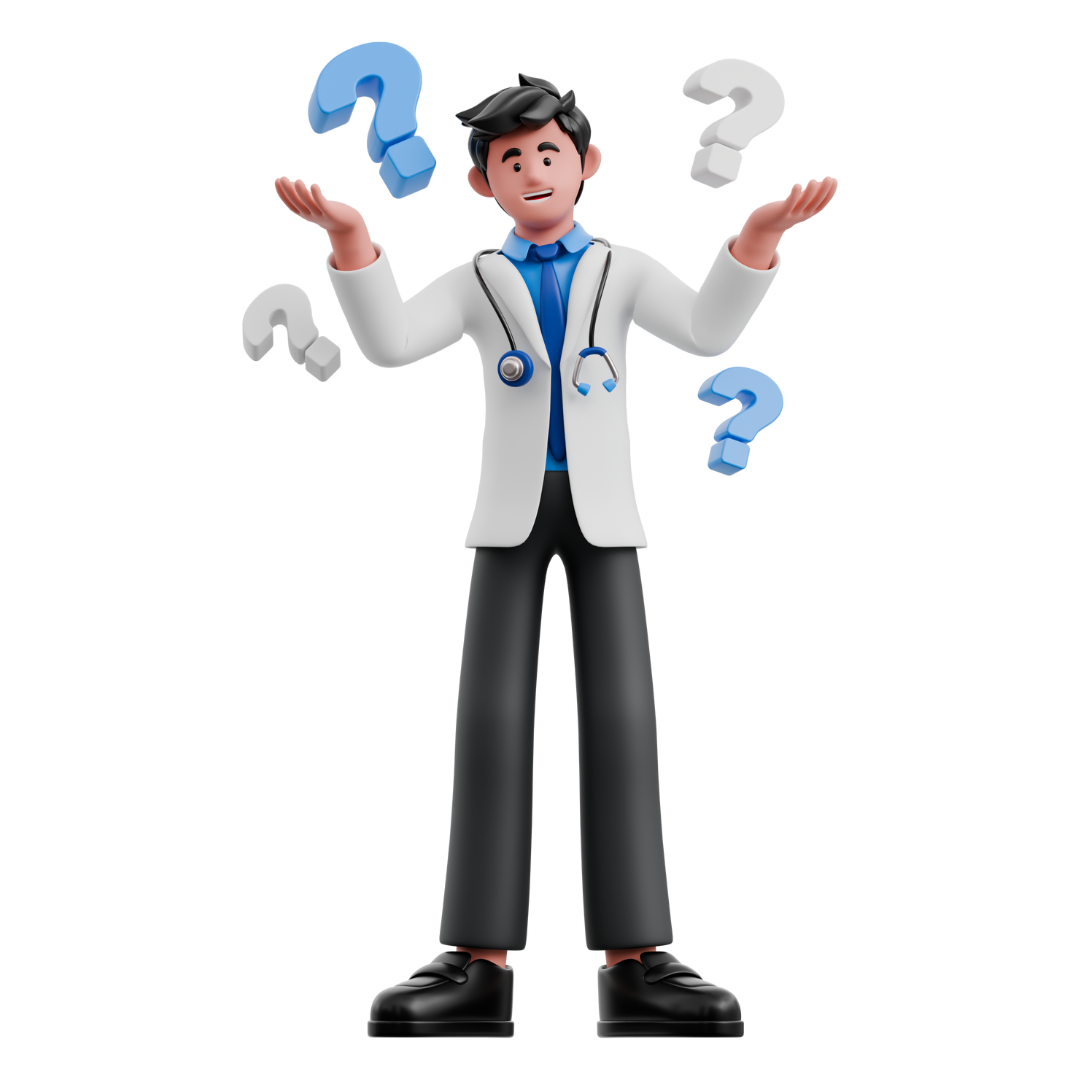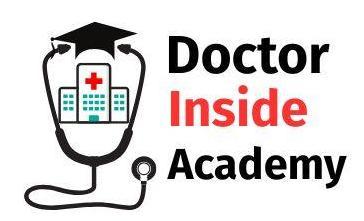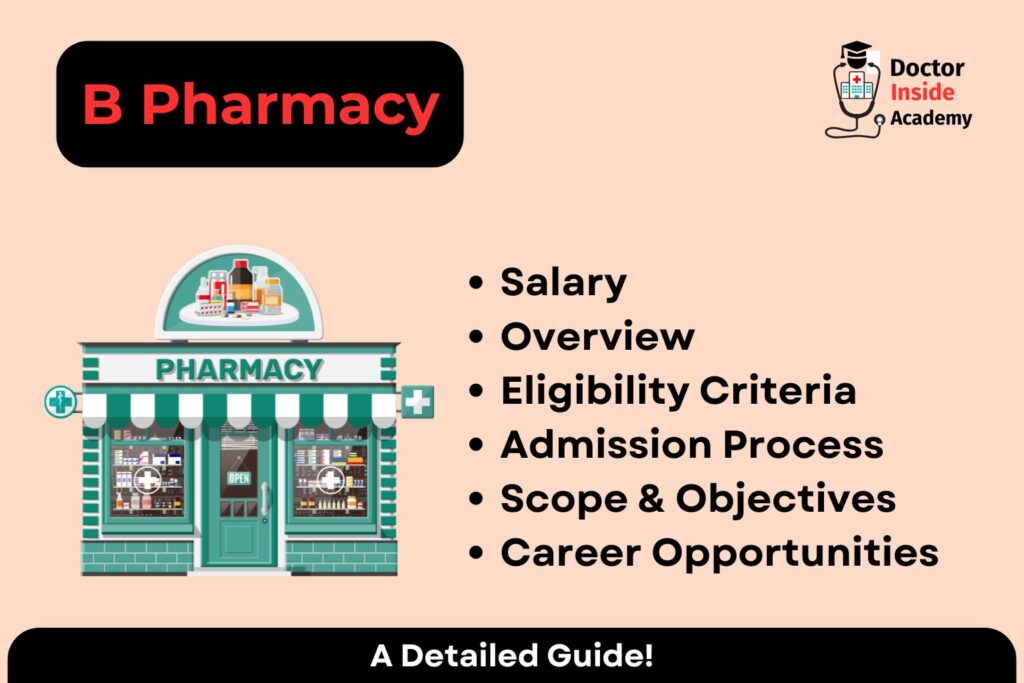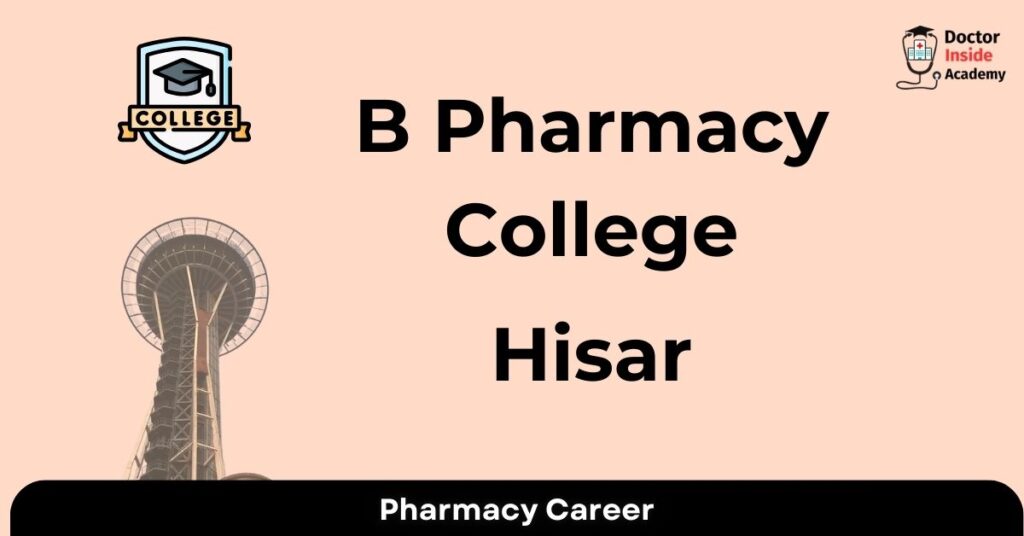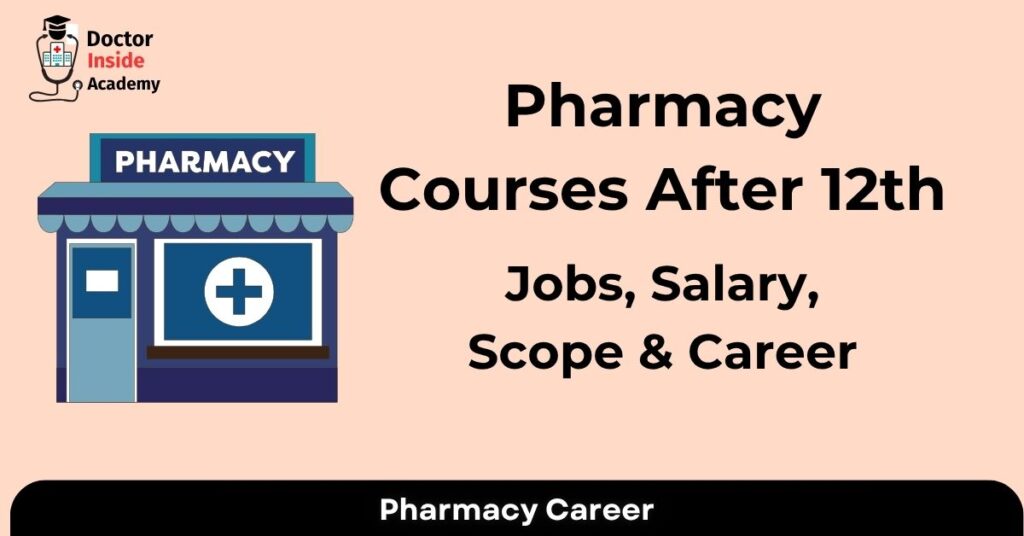B Pharmacy Course
Overview of Bachelor of Pharmacy
Bachelor of Pharmacy, or B Pharma, is a 4-year undergraduate degree program. It provides in-depth pharmacy education that covers every aspect, from technological advances and the practical significance of the pharmaceutical industry to pharmaceutical chemistry and pharmacology. You need to first finish your 10+2 or upper secondary school with science courses, including biology, chemistry, and physics, to get admission in any of the B Pharmacy programs.
- To work in research and development, the pharmaceutical business, or the healthcare sector, a bachelor’s degree in pharmacy is necessary.
Duration of B Pharmacy Course
- The average duration of the B Pharmacy course is 4 Years, and you can also practice with your current studies in nearby pharmacy or hospitals.
Bachelor of Pharmacy Course Includes
- Pharmacy courses help pharmacy students to excel in their jobs through a proper and disciplined teaching and learning approach with the help of experienced pharmacy teachers, who are knowledgeable about the fundamentals of their industry.
- To provide industry-focused research and education to develop a pool of science students who are in the pharmacy sector.
- To promote professional standards while upholding a feeling of social responsibility and to act between the healthcare system and the general public.
- To instil in the children a feeling of communication, leadership, and effective planning.
- To keep graduates up to date with advanced technologies and encourage them to continue their further education.
B Pharmacy Details
Particulars | Details |
Level | Undergraduate |
Duration | 4 Years |
Examination Type | Semester |
Fees | INR 20,000 – 1,500,000 Per Year |
Admission Criteria | Entrance Exam/Merit-Based/ Direct Admission |
Eligibility Criteria | 12th PCB with 50% Marks |
Job Profiles | Clinical Pharmacist, Medical Representative, Chemist, Drug Technician, Drug Inspector, Health Inspector, etc. |
Salary | INR 2.5 – INR 7.5 LPA |
Bachelor of Pharmacy Eligibility Criteria
- +2 with Physics, Chemistry, Biology/Math (PCB/PCMB) from a recognised board.
- You must score a minimum of 50% marks.
- At at time of admission, you must be 17 age.
Special Note:
- Many colleges require entrance exams (NEET or state-level). Seat distribution and counselling for those who were rendered during the shortlist.
- To find the most up-to-date and accurate information on the B.Pharm eligibility requirements and selection procedure, it is advisable to visit the official websites of the universities or institutions you are interested in.
B. Pharma LEET Course
- B. Pharma LEET is a 3-year Pharmaceutical science program, where a student can take the later entry 2nd year of this program.
- Anyone wishing to work as a pharmacist must complete the three-year undergraduate Bachelor of Pharmacy (LEET) program.
- The study of pharmacy involves making and administering medications for various ailments, treatment, diagnostics, chemical deficiencies, and much more.
B Pharma Entrance Exams
Here are a few B Pharmacy entrance exams, and a little about that exam is discussed, as follows:
Entrance Exam | Description |
NEET (National Eligibility cum Entrance Test) | National-level exam for admission to undergraduate medical and allied health science courses, including B Pharma. Subjects include Physics, Chemistry, and Biology. |
JIPMER Entrance Exam | Specific to Jawaharlal Institute of Postgraduate Medical Education and Research (JIPMER) institutions. Subjects may include Physics, Chemistry, Biology, English, Reasoning, etc. |
AIIMS Entrance Exam | Conducted by the All India Institute of Medical Sciences (AIIMS) for admission to its institutions. It covers physics, chemistry, biology, general knowledge, and aptitude. |
State-Level Entrance Exams | States conduct their exams for admission to B Pharma programs in colleges within their jurisdiction. Subjects include Physics, Chemistry, and Biology. |
Scope & Objectives of B Pharmacy Course
- Graduates with a B.Pharm. in India usually have good job prospects. Because the pharmaceutical industry is expected to continue growing, skilled workers will be needed.
- The Indian pharmaceutical industry is expected to grow significantly in the coming years, creating a demand for researchers, pharmacists, and other specialists.
- You can work in many pharmaceutical-related fields with a bachelor’s degree in pharmacy, including pharmacy practice, research and development, medical writing, and regulatory affairs.
- Pharmacy bachelor’s degree holders can find employment with the government as drug inspectors, hospital pharmacists, or research officers.
- If you want a career that focuses on research, you can pursue a doctorate or a master’s degree in pharmacy after receiving your bachelor’s degree.
- To impart a solid understanding of the foundational ideas and how they are used in the field of pharmaceutical sciences and technology
- To generate graduates in pharmacy who possess a solid understanding of basic principles and a high level of technical proficiency in pharmaceutical sciences using creative methods.
- In order to enhance leadership roles and enable the healthcare industry to improve with a unique professional identity, business acumen, worldwide recognition, and sustainable development, it is important to instill in the graduates a sense of regulation, professionalism, teamwork, communication skills, and social and ethical commitment.
- To teach the students how to support the healthcare system by raising awareness of healthcare issues and offering prophylactic and preventative disease counselling.

Syllabus of Bachelor of Pharmacy
The program’s curriculum is designed to provide a comprehensive understanding of B Pharmacy.
Here is an overview of the course content:
- Pharmaceutical Organic Chemistry
- Computer Applications in Pharmacy
- Pharmaceutical Inorganic Chemistry
- Human Anatomy & Physiology
- Pharmaceutical Chemistry
- Environmental Sciences
- Communication Skills
- Remedial Mathematics
- Dispensing Pharmacy
- Remedial Biology
- Pathophysiology
- Biochemistry
- Pharmaceutical Organic Chemistry
- Pharmaceutical Jurisprudence
- Pharmaceutical Microbiology
- Pharmaceutical Engineering
- Pharmaceutical Analysis
- Medicinal Chemistry
- Pharmacognosy
- Pharmacology
- Industrial Pharmacy
- Pharmaceutical Biotechnology
- Forensic Pharmacy
- Clinical Pharmacy
- Pharmacology & Toxicology of Heavy Metals
- Herbal Drug Technology
- Pharmacy Management & Entrepreneurship
- Medicinal Chemistry
- Industrial Pharmacy
- Pharmacology
- Herbal Drug Technology
- Pharmacognosy
- Quality Assurance
- Pharmaceutical Biotechnology
- Biopharmaceutics & Pharmacokinetics
- Research Work
- Instrumental Methods of Analysis
- Biostatistics & Research Methodology
- Industrial Pharmacy
- Social & Preventive Pharmacy
- Pharmacy Practice
- Pharmaceutical Product Development
- Novel Drug Delivery Systems
- Project Work
- Pharmaceutical Marketing
- Pharmaceutical Regulatory Science
B. Pharmacy Course Admission Process
Fill out Our Enquiry Form
Profile Evaluation by Experts
Get a Call Back from Our Counsellors
Career Opportunities After B Pharmacy
Pharmaceutical science students can pursue higher and better career opportunities. When the course has been completed, the potential candidates, with their skill set and aptitude scores, can enter different career paths. Graduates of B Pharmacy program can pursue various rewarding career paths.
Some of the job roles in B Pharma include:
- Research Scientist
- Clinical Pharmacist
- Analytical Chemist
- Drug Therapist
- Drug Technician
- Drug Inspector
- Pharmacist
- Quality Control Analyst
- Medical Representative
- Food and Drug Inspector
- Hospital Drug Coordinator
- Chemical Technician
- Research Officer
- Health Inspector
- Clinical Researcher
- Pathological Lab Scientist
- Research & Development Executive
Future Scope of B Pharmacy Course in India
- The pharmaceutical and healthcare sectors are expanding, and B.Pharmacy programs in India have a bright future. Since India is one of the world’s biggest producers of pharmaceuticals, pharmacy graduates have many options in manufacturing, quality assurance, R&D, and regulatory positions.
- B.Pharmacy graduates can work in government organisations, pharmaceutical companies, hospitals, and research facilities due to the growing emphasis on drug safety, innovation, and healthcare services.
- The field is becoming more dynamic and diverse as a result of the growing need for experts in clinical pharmacy, pharmacovigilance, and healthcare management.
- Graduates of the B Pharmacy program have the opportunity to pursue a variety of cutting-edge careers in addition to traditional ones, including biotechnology, clinical trials, regulatory affairs, and bioinformatics.
- To further improve their career prospects, many students decide to pursue postsecondary education, such as an MBA in Healthcare Management or an MPharm. Another important path is entrepreneurship, where graduates open their pharmacies or pharmaceutical manufacturing facilities.
- All things considered, B.Pharmacy programs in India offer a wide range of opportunities for specialisation, growth, and future contributions to medical and public health advancements.
Salary After a Bachelor of Pharmacy in India
- Experience, location, and the type of healthcare organization are some variables that affect the B Pharmacy pass out salary in India.
- In addition to B Pharmacy in India, candidates get a glance at the following job profiles:
Job Profile | Description | Average Salary (INR per year) |
Research Scientist | Conducts scientific studies to develop new drugs, therapies, or medical devices. | ₹6,00,000 – ₹15,00,000 |
Clinical Pharmacist | Dispenses medications in hospitals/clinics and advises on drug usage. | ₹3,00,000 – ₹8,00,000 |
Quality Control Analyst | Ensures pharmaceutical products meet quality standards through testing. | ₹3,00,000 – ₹6,00,000 |
Medical Representative | Promotes pharmaceutical products to healthcare professionals. | ₹2,00,000 – ₹6,00,000 + incentives |
Analytical Chemist | Analyzes chemical compositions of drugs or raw materials. | ₹3,00,000 – ₹7,00,000 |
Food and Drug Inspector | Inspects manufacturing units for compliance with safety regulations. | ₹3,00,000 – ₹6,00,000 |
Hospital Drug Coordinator | Manages the procurement and distribution of medicines in hospitals. | ₹3,00,000 – ₹7,00,000 |
Drug Therapist | Specializes in prescribing and managing drug therapies for patients. | ₹4,00,000 – ₹10,00,000 |
Chemical Technician | Assists in chemical analysis and laboratory testing. | ₹2,00,000 – ₹4,50,000 |
Drug Technician | Supports in manufacturing, testing, and quality checks of drugs. | ₹2,00,000 – ₹4,00,000 |
Drug Inspector | Ensures compliance with drug safety and manufacturing laws. | ₹3,00,000 – ₹6,00,000 |
Health Inspector | Checks sanitation and health standards in food, water, and public health sectors. | ₹2,50,000 – ₹5,50,000 |
Pharmacist | Dispenses medications and counsels patients on drug use. | ₹2,00,000 – ₹4,50,000 |
Research Officer | Manages research projects and ensures compliance with protocols. | ₹4,00,000 – ₹10,00,000 |
Pathological Lab Scientist | Performs diagnostic tests on patient samples to assist in diagnosis. | ₹2,50,000 – ₹5,50,000 |
Research & Development Executive | Develops new products, formulations, or processes in pharma/biotech sectors. | ₹5,00,000 – ₹12,00,000 |
Clinical Researcher | Conducts clinical trials to evaluate new drugs or therapies. | ₹4,00,000 – ₹10,00,000 |
Note: These stats are only for educational purposes; real-time stats may depend on the areas, levels, types of clinical facilities, etc.
Get Free Counselling
Pharmacy News & Updates
Here, you will find the latest pharmacy career guides, admission counselling, resources, insights, syllabus, career options, and and much more, resources, insights, syllabus, career options, and more. Stay connected.
B Pharmacy FAQ
B Pharmacy equips you for diverse pharmacy careers. You’ll understand drugs, their creation, and regulations. This opens doors to pharmacy practice, research & development, healthcare roles, and government jobs.
No, NEET is not mandatory for B Pharmacy (B.Pharm) admissions in most cases. B Pharmacy offers a wide range of career options in the pharma industry, research, hospitals, and more.
There are numerous job opportunities available to graduates of the B.Pharm program. They may ensure that drugs are dispensed correctly and that patients are taken care of in both retail and hospital pharmacy environments. Drug development, quality assurance, and regulatory affairs are among the positions offered by pharmaceutical businesses.
Graduates can also work in research, helping to develop novel medications and treatments, or they might go into academia to supervise and instruct aspiring pharmacists. Opportunities in clinical trials, pharmacovigilance, medical writing, and health informatics are also available, making B. Pharmacy is a flexible and exciting area.
Although there are now more pharmacy schools around the nation than there were a few years ago, students who do not want to move can enrol in any reputable B Pharma institution in their city.
Depending on their courses, candidates should consider several aspects when selecting the appropriate institution. Here are some guidelines for potential students to help them choose and apply to the top pharmacy schools.
Although there are now more pharmacy schools around the nation than there were a few years ago, students who do not want to move can enrol in any reputable B Pharma institution in their city.
Depending on their courses, candidates should consider several aspects when selecting the appropriate institution. Here are some guidelines for potential students to help them choose and apply to the top pharmacy schools.
Depending on your desired career path, several advanced courses can help you advance your career after earning a B. Pharm. Here are a few top courses to think about: Some of the top courses to think about are listed below:?
- Master of Pharmacy (M. Pharm)
- MBA in Pharmaceutical Management
- Pharm.D (Doctor of Pharmacy)
- PG Diploma in Clinical Research
- PG Diploma in Pharmaceutical Quality Assurance
- MS in Pharmaceutical Sciences (Abroad)
- Regulatory Affairs Certification
- Certification Courses
There are many B Pharmacy courses in India, but Team Doctor Inside Academy is the leading B Pharmacy career counseling in India. They help you in selecting a college, and also help you in getting the best in your pharmacy academic journey.
